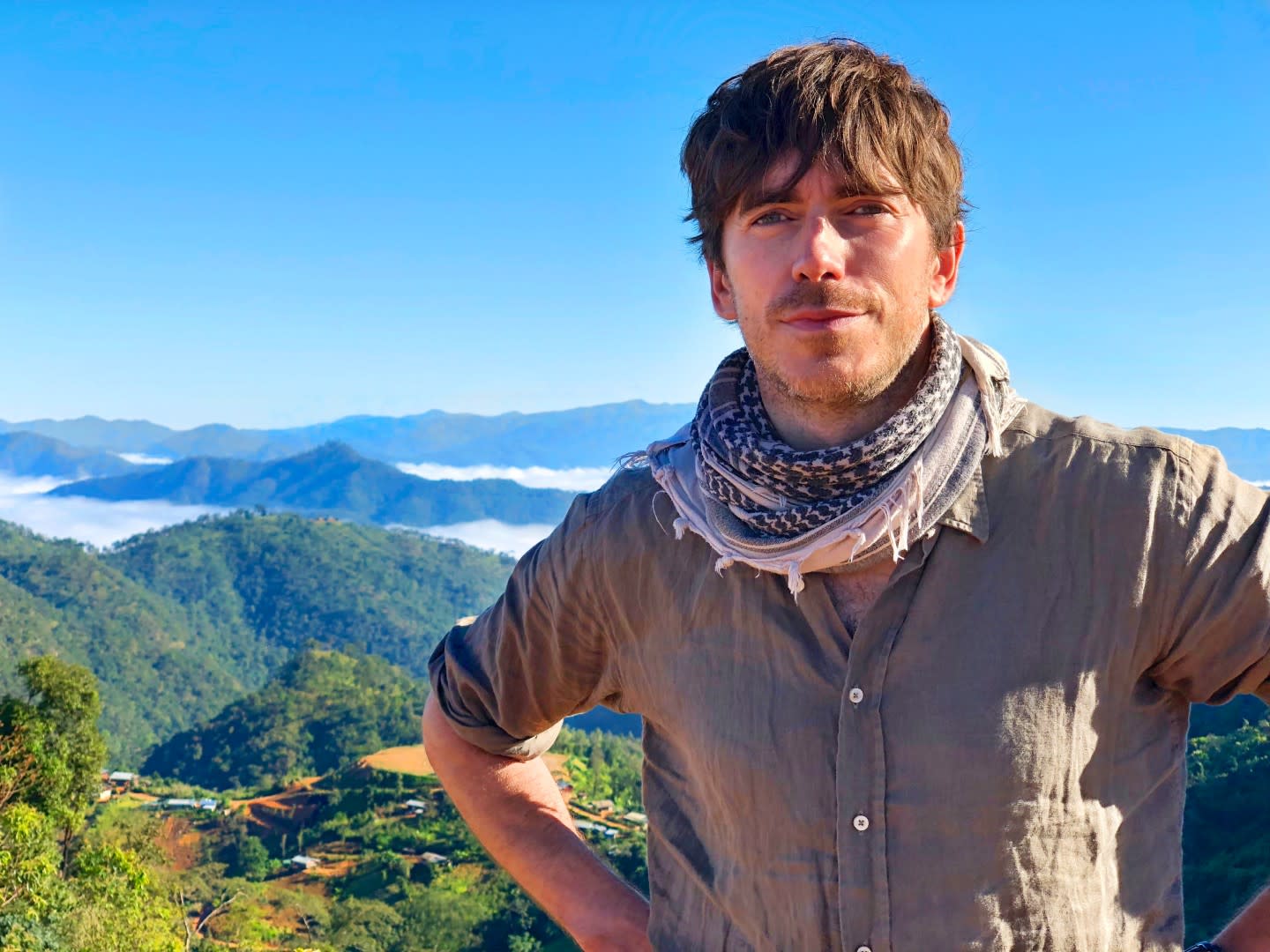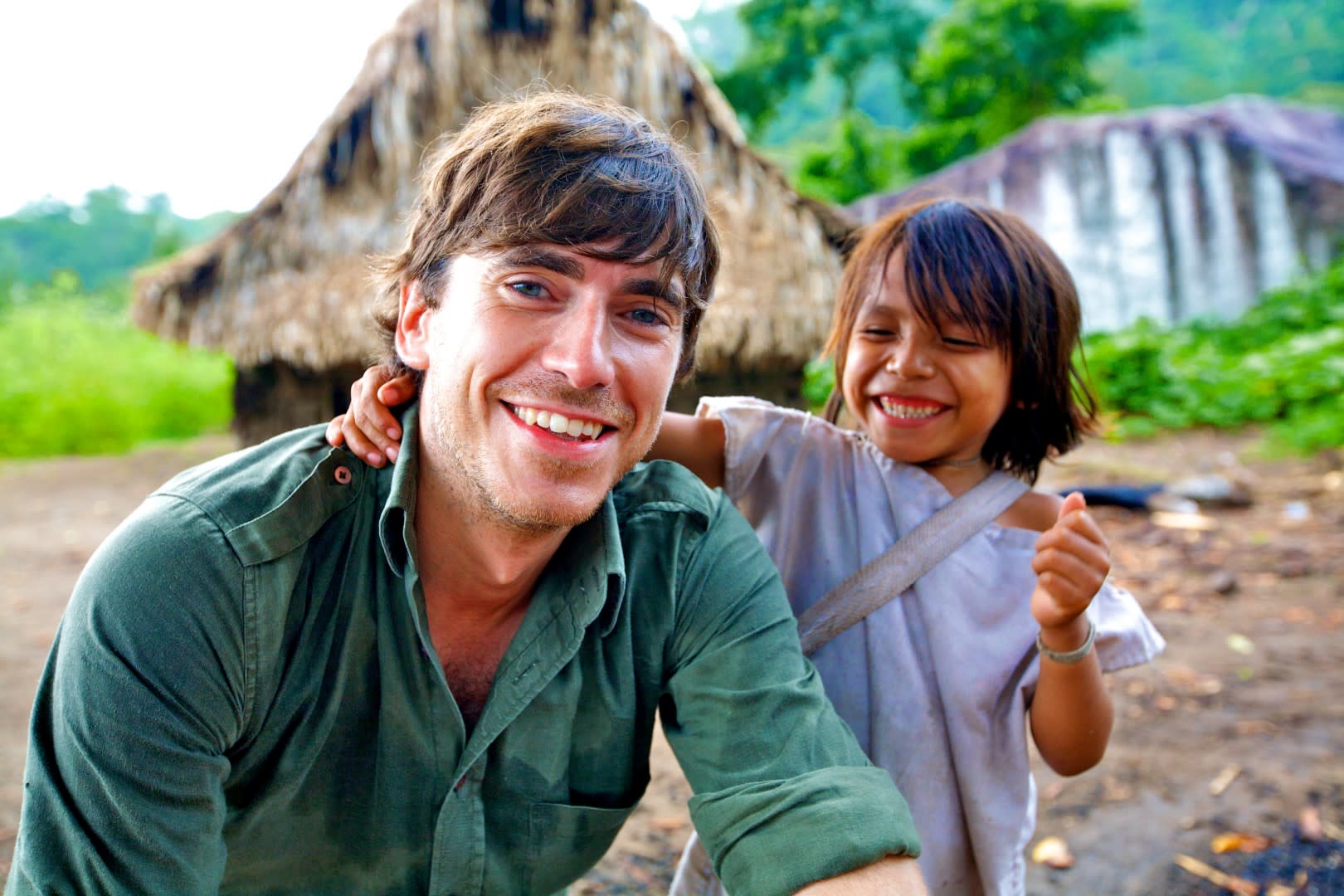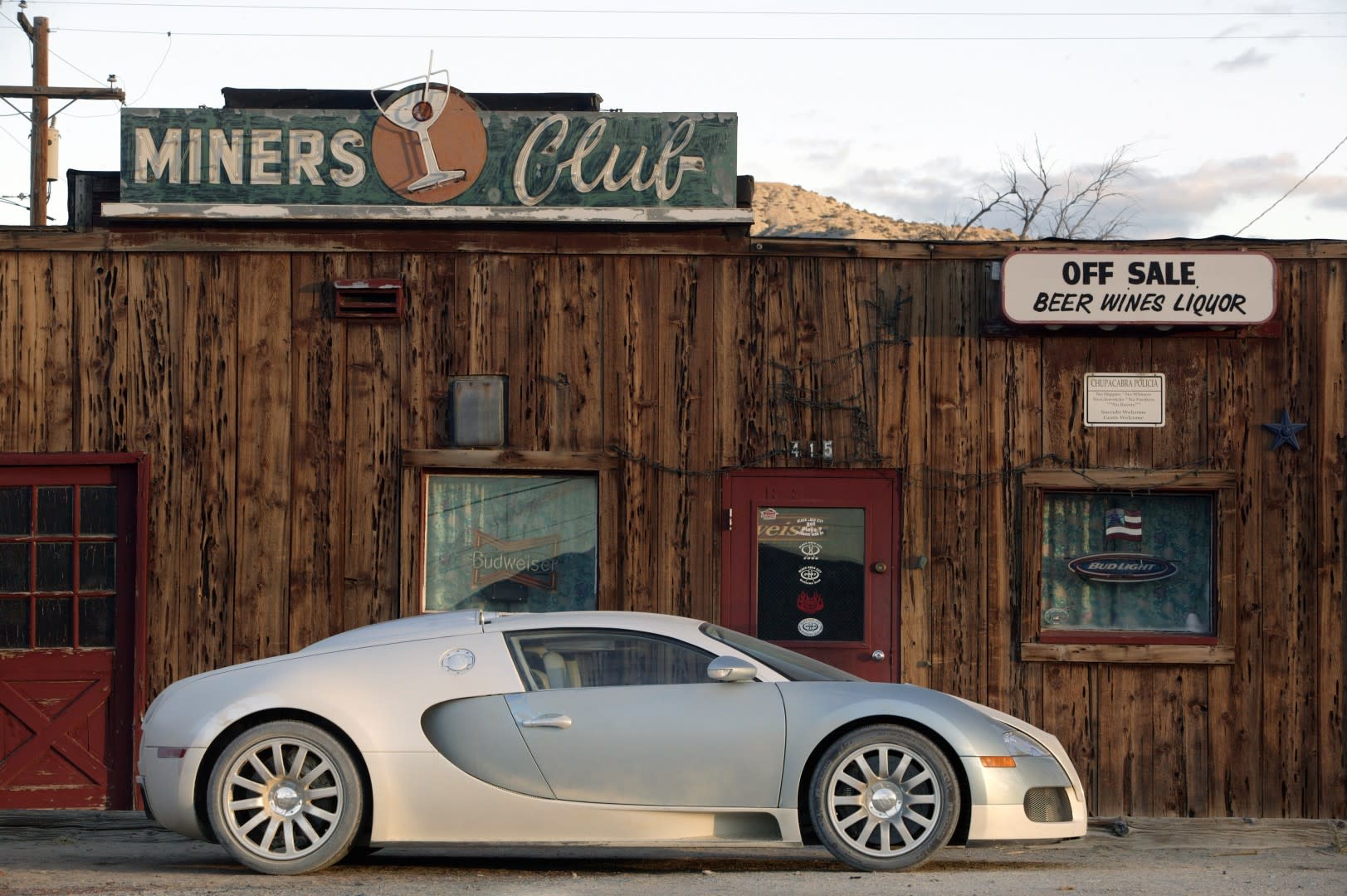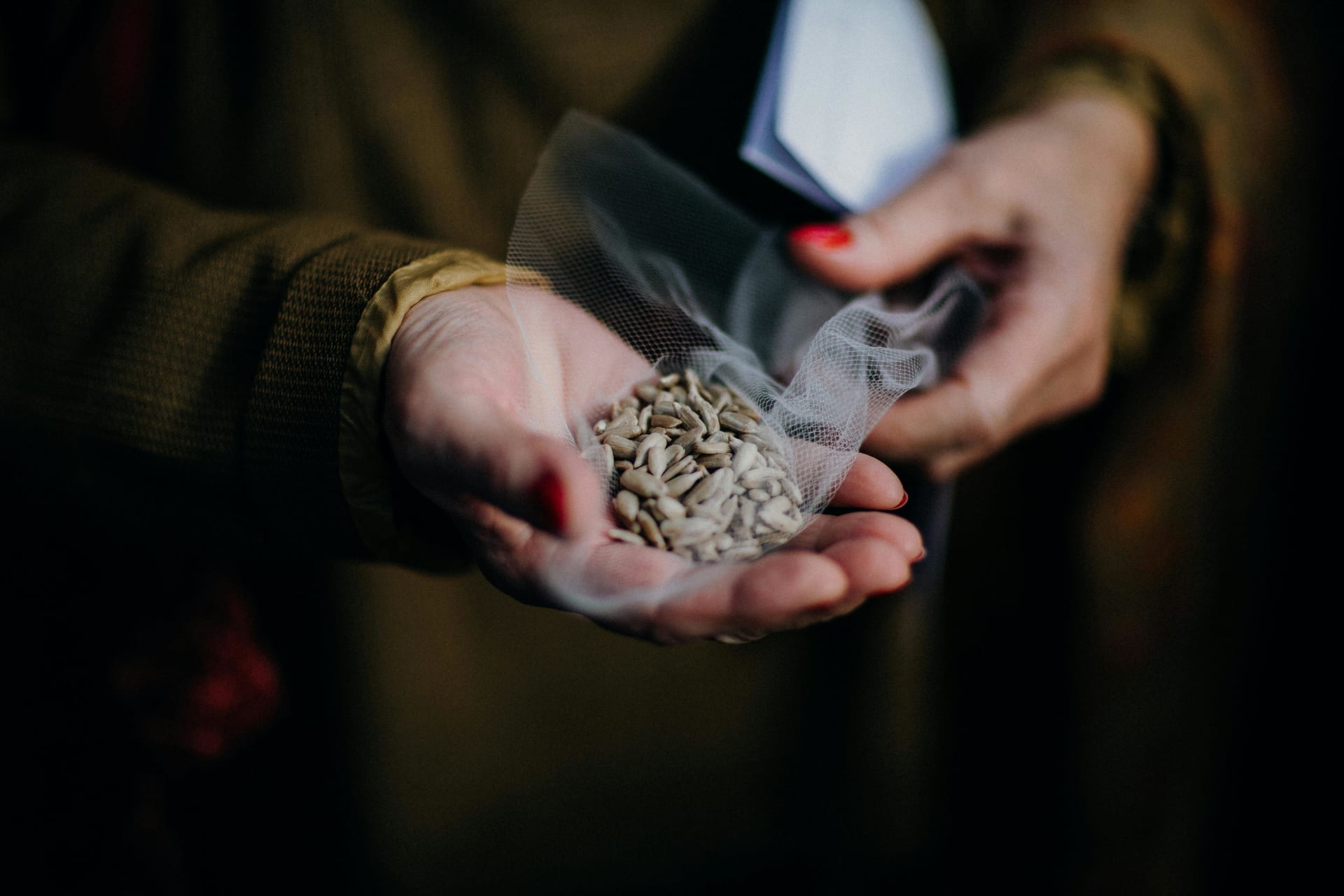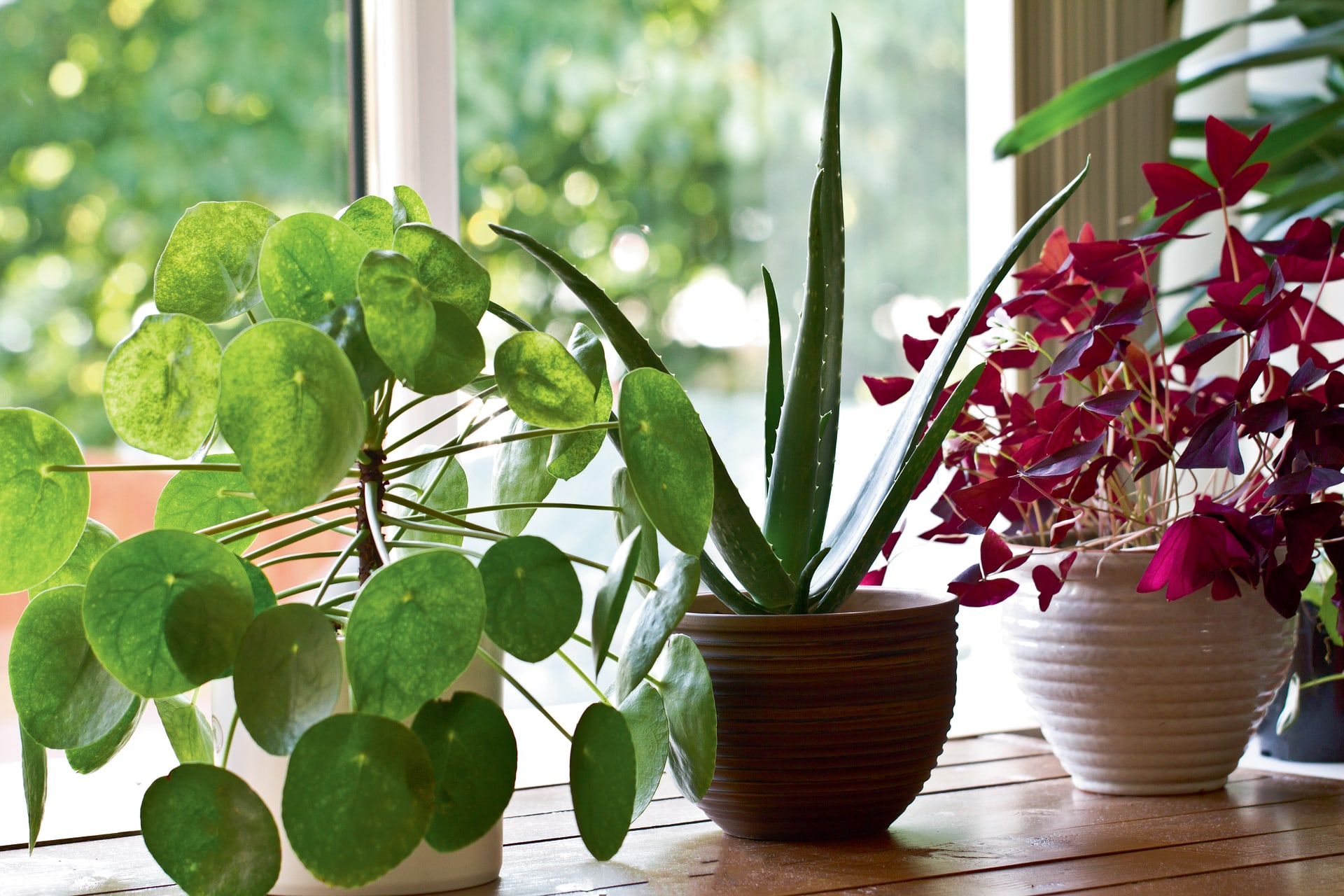In over 20 travel series, Simon Reeve has hunted with the Bushmen of the Kalahari, been chased by pirates, hounded by the Mafia and detained by the KGB. He’s been to over 120 countries, ranging across deserts, mountains, jungles and oceans. Enough to complete a bucket list (or two) and perhaps plenty to permit thinking he’s a guffawing, swashbuckling, Walter Raleigh type, but when I speak to him, he’s still reeling from his son’s eighth birthday party.
“I’m wondering around like a zombie, dazed by it all,” he says with a wide-eyed tone. “There are life’s adult travel challenges, then there are the more serious ones of keeping small children away from water sources and ‘OH MY GOD put down those candles’ and ‘No don’t shoot that other child in the head with a Nerf gun.’” I tell him I become hyperaware of furniture corners when kids are about. “You’re so right. You start realising that the table you bought from IKEA is like a collision zone. You then discover the whole world of these corner foam padding things that you can buy to stop your helpless and faintly ludicrous small creature from constantly smashing its head. How come there are so many of us when the tiny things are so vulnerable? It’s unbelievable. Bloody bison can stand within 30 seconds and fight a wolf pack in 30 minutes.”
His memoir, Step By Step: The Life in My Journeys is excellent, written in very direct and unassuming prose. His extraordinary journeys speak for themselves and he serves them to us without the self-aggrandising fluff and flab of the intellectually insecure. It’s also commendable for its courage and candour. He starkly relays the difficulties he faced as a young man – brushes with the law, a tumultuous relationship with his father, trouble at school – and traces how they compounded until he found himself teetering on a bridge, trying to choose a lorry to jump under. He brings out the ugliness of depression, but also its banality. He writes, “There was no single moment of disaster that pushed me to the edge. No catastrophe. Just a nudge here and there can shift some of us from what passes for stability to a state of maddening despair.” Depression won’t often announce itself or come as the appendix to some other cataclysm; it can sneak and creep and grow like weeds in the shade.

© Shoot and Scribble
One has to be wary of elevating oneself or others to the position of spokesperson. Everyone’s experience is different, something he states clearly. What is undisputable is that suicide takes the lives of more men aged 20-49 each year than cancer, heart disease and road accidents. His thoughts on it all rest in familiar territory – “I think we need to talk about it more and accept more openly and widely our fundamental fragility as individuals. We need to recognise that we are being peddled an image of perfection that is corrosive but addictive and fundamentally socially dangerous as well.” He sounds exasperated and bemused as he continues, “What I think is ludicrous is that as a society we aren’t able to tackle this. We need to tackle it faster and more aggressively.” Touring his Audience with Simon Reeve show he’s “stunned” at the amount of people who have approached him afterwards, thanking him.
Despite assuming that “Brits have got better things to do than come and listen to me natter away” his 46-date tour has been extended twice “Maybe they feel sorry for me.” His headline-grabbing stories make great blurbs (and first paragraphs) but I wonder what stays with him; the things he’s learned that you wouldn’t find in a Tom Clancy novel. “The moments that linger for me are not necessarily big moments, they’re small moments of sharing and intimacy with people I’ve met along the way. It doesn’t take much for somebody to share really quite astonishing details of their life, and that’s an amazing experience to be part of.” The key is to concertedly break down obstacles – “They can often be the barriers of wealth and nationality as well as obviously language. So the more you can break down or reduce those barriers the better. I mean, how people can talk to poor foreign folk while wearing sunglasses is completely beyond me.”
You have to wonder what the effect of a TV crew is in some situations. In his experience a camera “creates an instant dynamic. It gives an incentive and an impetus. A lot of people around the world understand that a camera is capturing a story and a situation and if they want, they have a role to play. It amazes me how many people step up to that.” In “very remote places” where people don’t recognise what a camera is, he says, you’re such an outsider that they’re “drawn to or deterred by you” anyway. Talk of outsider/insider dynamics prompts my asking his opinion on the controversy surrounding Comic Relief’s work in Uganda with Stacey Dooley, where allegations of ‘white saviour’ imagery were levelled by the MP David Lammy. “I think it’s a very fair concern. It’s long been a problem that we as simplistic Brits see the rest of the world in stereotypes – but every country does that. We see all South American countries as being pretty similar, we see Africa as basically one country and I think that fails to recognise… well, anything really – the complexity, the cultures, the economics, the finances, the corruption, the colonialism – all of the issues that make it extraordinary and troubled at the same time.”

© Shoot and Scribble
Before he made travelogues for the BBC, Simon worked for Andrew Neil at The Sunday Times. His rise through the ranks there would make an excellent screenplay – from sorting mail to reporting on the 1993 World Trade Centre bombing. This reporting culminated in his 1998 book on the future of terrorism, The New Jackals, which flew below the radar until that fateful day in September 2001. He describes how, even while at the paper in the early nineties, belts were tightening at the expense of long, costly, foreign investigations. What can we do now to ensure we get accurate foreign reporting? “I would put government money into it,” he says firmly. “It’s the sort of thing that gets cut back easily, but my God, we need to know more than ever about what’s happening in the rest of the world because we are more inextricably linked with it than at any other time.”
He once said in an interview that he turned on the TV to see Michael Portillo “relaxing in a bath looking out over the Taj Mahal” making him wonder if he’s got the wrong gig. His programmes are certainly a bit more shrapnel than champagne – does having a son change his outlook on his work? “Not hugely – I think I’m pretty good at gauging risk … I don’t think we’re making crazy programmes. I think people have a very strange view of life now that it’s fundamentally safe, when everything about our existence is fragile and rickety, and that’s how it’s always been.” A refreshing perspective from a man who, having walked across minefields, frets about candles and Nerf guns.
An Audience with Simon Reeeve comes to New Theatre Oxford on 28 October
atgtickets.com

